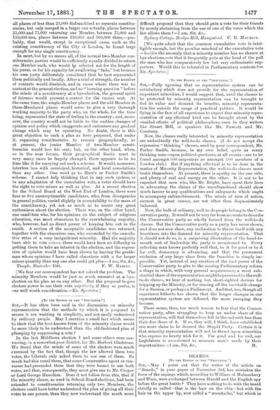BEARDS.
[To THE EDITOR OF THE "SPECTATOR."]
Stn,—May I point out that the writer of the article on "Beards," in your paper of November 3rd, has mistaken the force of the sayings which, according to William of Malmesbury and Wace, were exchanged between Harold and the English spy before the great battle ? They have nothing to do with the beard strictly so called—that is the hair on the chin—but with the hair on the upper lip, now called a " moustache," but which in Sir Roger de Coverley's day still kept its true name of " whiskers."
I have explained the matter in two or three places in my "History of the Norman Conquest;" but nothing is needed but to look at the Bayeux Tapestry. The notion about beards as a distinction between English and Normans comes, I imagine, from the romantic account given by Matthew Paris of William- with-the-Long-Beard, in the time of Richard I., an account widely different from that given by tho contemporary writers, and which Thierry naturally improved into a wilder version still.
In the Tapestry, William and Harold, and the mass of their re- spective countrymen, are all alike beardless. The difference is that the English, while shaving the rest of the face, left the hair on the upper lip ; the Normans cut off that also. The spy there- fore says :—" Pene omnes in exercitu illo presbyteros videri, quod totam faciem, cam ?drogue labio, rasam haberent." " Angli enim superins labrum pilis incessanter frueticantibus intonsum dimittum, quod etiam gentilitium antiquis Britonibus fuisse Julius Caesar asseverat, in libro Belli Gallici." The words " pene omnes" are to be noticed. While the Tapestry shows that the generation represented by Harold and William shaved both in England and in Normandy, it seems to show further that the fashion was a new one in both countries. A few elderly men on each side wear their beards. Conspicuous among them is King Edward, who, as we know from his bio- grapher, had a white beard, and who most likely represents a Norman rather than an English fashion. And " Barbatus " is an occasional nickname in the days of the Conquest, showing that the beard, though it was marked as singular, had not wholly gone out of use.
As for "the conquerors of Senlac imposing their custom of shaving upon the conquered," as for its being "one of the grievances of the English under their new masters that they were compelled to shave," there is nothing like it in any con- temporary writer. Moreover the English were not " compelled " to do anything in such matters. They were largely influenced by Norman fashions, as the Normans were largely influenced by English fashions ; but there was no compulsion either way.—I am, Sir, &c., Abbots Langley, November 8th. EDWARD A. FREEMAN.



































 Previous page
Previous page